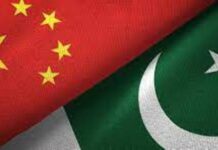BEIJING: The Olympic Summer Games Tokyo 2020 concluded on August 8, and China took home a grand total of 38 gold medals and 88 medals, ranking second in the medal tally. When speaking of China’s Olympic performance, one individual deserves some extra recognition. That is Juan Antonio Samaranch, the Seventh President of the International Olympic Committee (IOC) and the man who supported China to resume its legitimate seat on the IOC as well as its bidding for the Olympic Summer Games Beijing 2008.
In 1954, the People’s Republic of China (PRC) for the first time ever obtained a spot on the IOC. Nevertheless, only two years later, then IOC President Avery Brundage advocated assigning Taiwan a legal seat, thereby supporting the “two Chinas” conception. In response, the Chinese Government refused to participate in the 16th Olympic Games in Melbourne, Australia, and further announced it would terminate all ties with the IOC. Things began to change when Brundage stepped down in 1972. Late Chinese leader Deng Xiaoping proposed to restore China’s legal seat on the IOC in 1974 and in April 1978, Samaranch visited China as the committee’s first vice president. He carefully studied Chinese history and cross-Taiwan Straits relations. He said, “The IOC has no reason to reject a large country with a population of 1 billion. China is one big family. Anyone attempting to divide it will eventually fail.”
On account of his efforts, China’s application to rejoin the IOC was passed in 1979. This achievement is inseparable from Samaranch’s understanding and support of the Communist Party of China (CPC)’s concept of governance. Samaranch’s friendship with China was captured in a new book entitled Shared Ideals: The Communist Party of China and Its Cherished Friends From Around the World recently published by the Foreign Languages Press (FLP). The book selects 18 representative international friends of the CPC from different historical periods and geographical areas as well as of various professions. That includes famous American writer and journalist Edgar Snow, whose representative work Red Star Over China tells the stories of the CPC and its leaders; and Indian doctor Dwarkanath Kotnis who worked as a surgeon for the CPC-led Eighth Route Army during the Chinese People’s War of Resistance Against Japanese Aggression (1931-45).
– The Daily Mail-Beijing Review News exchange item




